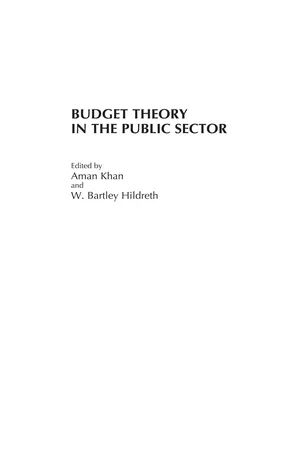
- 320 pages
- English
- PDF
- Available on iOS & Android
Budget Theory in the Public Sector
About this book
Dominated by multiple, competing, and occasionally overlapping theories, the act of budgeting is by no means a staid, dispiriting task. Kahn, Hildreth, and their group of scholars and practitioners show that budgeting is an institutional process, an incremental decision-making tool, and when correctly applied becomes a tribute to managerial and administrative efficiency. Taken together, the chapters provide an unusually coherent conceptual foundation for budgeting as a legitimate field of study, and demonstrate yet again that in its current state the field is truly eclectic but compartmentalized. They also show why it is so difficult to come up with one unified theory of budgeting—and that is one of the book's major benefits. It opens new areas of inquiry that, in the opinion of Khan, Hildreth, and others, will generate renewed interest in probing the field's theory and applications. Understandable and readable for those with limited knowledge of the subject but needing a sufficiently useful grasp of its various issues and problems, the book is both an important reference work for scholars in the field and a practical guide for students of administration, their teachers, and for managers throughout the public sector.
Frequently asked questions
- Essential is ideal for learners and professionals who enjoy exploring a wide range of subjects. Access the Essential Library with 800,000+ trusted titles and best-sellers across business, personal growth, and the humanities. Includes unlimited reading time and Standard Read Aloud voice.
- Complete: Perfect for advanced learners and researchers needing full, unrestricted access. Unlock 1.4M+ books across hundreds of subjects, including academic and specialized titles. The Complete Plan also includes advanced features like Premium Read Aloud and Research Assistant.
Please note we cannot support devices running on iOS 13 and Android 7 or earlier. Learn more about using the app.
Information
Table of contents
- Contents
- Preface
- Acknowledgments
- 1 Budget Theory for a New Century Lance T. LeLoup
- 2 Early Budget Theory: The Progressive Theory of Public Expenditures Julia Beckett
- 3 The Separation of Powers Principle and Budget Decision Making Thomas P. Lauth
- 4 Nonconventional Budgets: Interpreting Budgets and Budgeting Interpretations Gerald J. Miller
- 5 A Multiple Rationality Model of Budgeting: Budget Office Orientations and Analysts’ Roles Katherine G. Willoughby
- 6 The Principal-Agent Model and Budget Theory John Forrester
- 7 Responsibility Budgeting and Accounting Reform L.R. Jones and Fred Thompson
- 8 Budget Theory for Public Administration . . . and Public Administrators Gerasimos A. Gianakis and Clifford P. McCue
- 9 The Theory of the Public Sector Budget: An Economic Perspective Merl Hackbart and James R. Ramsey
- 10 Budgets as Portfolios Aman Khan
- 11 Punctuated Equilibrium: An Agenda-Based Theory of Budgeting Meagan M. Jordan
- 12 The Impact of Agency Mission on Agency Budget Strategy: A Deductive Theory Marcia Lynn Whicker and Changhwan Mo
- 13 Budgeting for Outcomes Lawrence L. Martin
- 14 Philosophy, Public Budgeting, and the Information Age Thomas D. Lynch and Cynthia E. Lynch
- Selected Bibliography
- Index
- About the Contributors